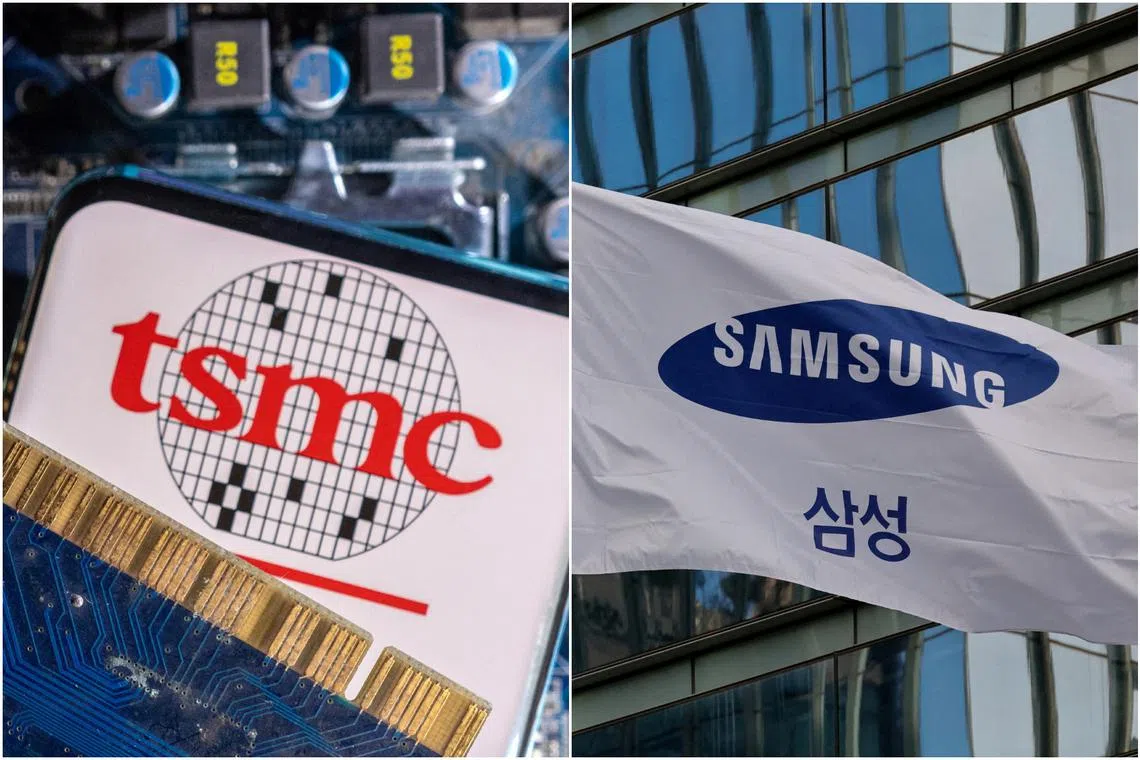TSMC gets $8.9 billion in grants to ramp up US chip production; Samsung may get over $8 billion
Sign up now: Get ST's newsletters delivered to your inbox

TSMC's award is one of the largest announced under Mr Biden's plan to boost the US semiconductor industry..
PHOTOS: REUTERS
Washington - The US plans to award Taiwan Semiconductor Manufacturing Co (TSMC) US$6.6 billion (S$8.9 billion) in grants and as much as $5 billion in loans to help the world’s top chipmaker build factories in Arizona, expanding President Joe Biden’s effort to boost domestic production of critical technology.
South Korea’s Samsung Electronics, meanwhile, is expected to receive a grant of more than US$6 billion (S$8 billion) to expand its chip output in Taylor, Texas.
Under a preliminary agreement announced by the US on April 8, TSMC will construct a third factory in Phoenix, adding to two facilities in the state that are expected to begin production in 2025 and 2028.
In total, the package will support more than US$65 billion in investments at the three plants by TSMC, the go-to chipmaker for companies such as Apple and Nvidia.
TSMC’s third fabrication site will rely on next-generation 2-nanometre (nm) process technology, and is slated to be operational before the end of the decade.
US Commerce Secretary Gina Raimondo said the 2nm chips are essential to emerging technologies including artificial intelligence, as well as for the military.
“For the first time ever, we will be making at scale the most advanced semiconductor chips on the planet here in the United States of America, by the way, with American workers,” Ms Raimondo told reporters in a briefing ahead of the announcement.
TSMC is planning to first make 2nm chips in Taiwan in 2025.
It will be months before TSMC receives any of the promised funding, as the company enters a due-diligence period before reaching a final, binding agreement. Money will then be disbursed based on construction and production benchmarks, and could be clawed back if TSMC does not hold up its end of the deal.
TSMC’s award marks another milestone in Mr Biden’s push to boost the US semiconductor industry with the 2022 Chips and Science Act.
Samsung’s subsidy, which will be unveiled by Ms Raimondo next week, will go towards the construction of four facilities in Taylor, including one US$17 billion chipmaking plant that Samsung announced in 2021, another factory, an advanced packaging facility and a research and development centre, one of the sources said.
It will also include an investment in another undisclosed location, the source said, adding that Samsung will more than double its US investment to over US$44 billion as part of the deal.
The US Commerce Department has also handed three awards to companies that manufacture older-generation chips and is expected to announce a multi-billion dollar package for Micron Technology in the coming weeks.
Companies have announced more than US$200 billion in US investments since Mr Biden took office, with the biggest clusters emerging in Arizona, Texas and New York. The agreement unveiled on April 8 emerged after months of negotiations with the Commerce Department and TSMC, the world’s largest contract chipmaker by market share.
“The proposed funding from the Chips and Science Act would provide TSMC the opportunity to make this unprecedented investment and to offer our foundry service of the most advanced manufacturing technologies in the United States,” TSMC chairman Mark Liu said in a statement.
TSMC’s work in Phoenix carries added political stakes for Mr Biden, who defeated Donald Trump in Arizona by roughly 10,000 votes in 2020 and is seeking another win in the closely contested state to help secure re-election. Although TSMC’s Arizona investment was initiated during Trump’s final year in office, its projects in the state have become increasingly entwined with Mr Biden’s campaign message on revitalising the economy.
“Semiconductor manufacturing and jobs are making a comeback” in the US, Mr Biden said in a statement released by the White House hailing the agreement. “Today, we continue building on that historic progress.”
Arizona has reaped some of the biggest rewards from the Chips Act, with a massive expansion by Intel in addition to dozens of supply chain initiatives. The TSMC grant includes US$50 million in funding to train local workers, and will create 6,000 high-tech manufacturing jobs and more than 20,000 construction jobs, Ms Raimondo said.
The TSMC site has seen several setbacks, including months of conflict with labour unions that resulted in delays at the first factory. The second facility, which is now slated to begin manufacturing 2nm and 3nm chips in 2028, was delayed from 2026 due to market conditions and uncertainty about levels of US government support. At least one TSMC supplier has scrapped its planned Arizona project, citing workforce difficulties.
The company has other international projects under way in Japan and Germany. TSMC held an opening ceremony in 2024 for its Kumamoto facility, which the Japanese government is backing with subsidies. BLOOMBERG, REUTERS


